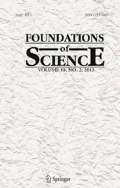Abstract
This paper considers the role of mathematics in the process of acquiring new knowledge in physics and astronomy. The defining of the notions of continuum and discreteness in mathematics and the natural sciences is examined. The basic forms of representing the heuristic function of mathematics at theoretical and empirical levels of knowledge are studied: deducing consequences from the axiomatic system of theory, the method of generating mathematical hypotheses, “pure” proofs for the existence of objects and processes, mathematical modelling, the formation of mathematics on the basis of internal mathematical principles and the mathematical theory of experiment.
Similar content being viewed by others
References
Aristotle. (2007). Physics, 206 a 20 (trans: Hardie, R. P. & Gaye, R. K.). http://classics.mit.edu/Aristotle/physics.html.
Barnes V. E. (1964) Physical review letters 12: 204
Bell E. T. (1951) Mathematics, queen and servant of science, chap. 2. McGraw-Hill, New York
Beiser, A. (1981). Concepts of modern physics (3rd ed.). McGraw-Hill, International Book Company, pp. 64, 211, 476, 490–491.
Bunge M. (1973) Philosophy of physics, chap.7. Kluwer, Dordrecht
Burcham W. E. (1972) Nuclear physics-an introduction, chap. 21. Longman Group Limited, London
Churchman C. W. (1956) Science and decision making. Philosophy of science 23: 247–252
Davies P. (1984) Superforce, chap. 4. Simon & Schuster, New York
Grujic P. V. (2001) The concept of fractal cosmos: I. Anaxagoras’ cosmology. Serbian Astronomical journal 163: 21–34
Grujic P. V. (2002) The concept of fractal cosmos: II. Modern cosmology. Serbian Astronomical journal 165: 45–65
Grujic P. V. (2007) Some epistemic questions of cosmology. Foundations of science 12: 39–83
Kane G. (1987) Modern elementary particle physics. University of Michigan, Addison-Wesley, MI
Kline M. (1980) Mathematics, the loss of certainty, chaps. 1, 6, and 12. Oxford University Press, New York
Kline M. (1985) Mathematics, and the search for knowledge, chaps. 2, 5, and 12. Oxford University Press, New York
Kuhn, T. (1977) Objectivity, value judgment, and theory choice, In Kuhn, T. (Ed.), The essential tension (pp. 320–339). Chicago and London: University of Chicago Press.
Lakatos, I. (1978). Mathematics, science and epistemolgy (Lakatos Philosophical papers) (Vol. 2, pp. 3–24) Cambridge: Cambridge University Press.
Mandelbrot B. B. (1982) The fractal geometry of nature. WH Freeman and Co, New York
Obradovic S. (2002) The nature of axioms of physical theory. European journal of physics 23: 269–275
Popper, K. R. (1962). (1945) The open society and its enemies (Vol. 2, p. 380) London: Routledge & Kegan Paul.
Robinson A. (1970) Non-standard analysis. North-Holland, Amsterdam and London, p 13
Thagard P. R. (1978) The best explanation: Criteria for theory choice. Journal of Philosophy 75(2): 76–92
Vladimirov V. S., Volovich I. V., Zelenov E. I. (1994) p-Adic analysis and mathematical physics. World Scientific, Singapore
Whewell, W. (1847). The philosophy of the inductive sciences (Vol. 2, pp. 67–68). London.
Author information
Authors and Affiliations
Corresponding author
Rights and permissions
About this article
Cite this article
Obradović, S., Ninković, S. The Heuristic Function of Mathematics in Physics and Astronomy. Found Sci 14, 351–360 (2009). https://doi.org/10.1007/s10699-009-9162-2
Published:
Issue Date:
DOI: https://doi.org/10.1007/s10699-009-9162-2




